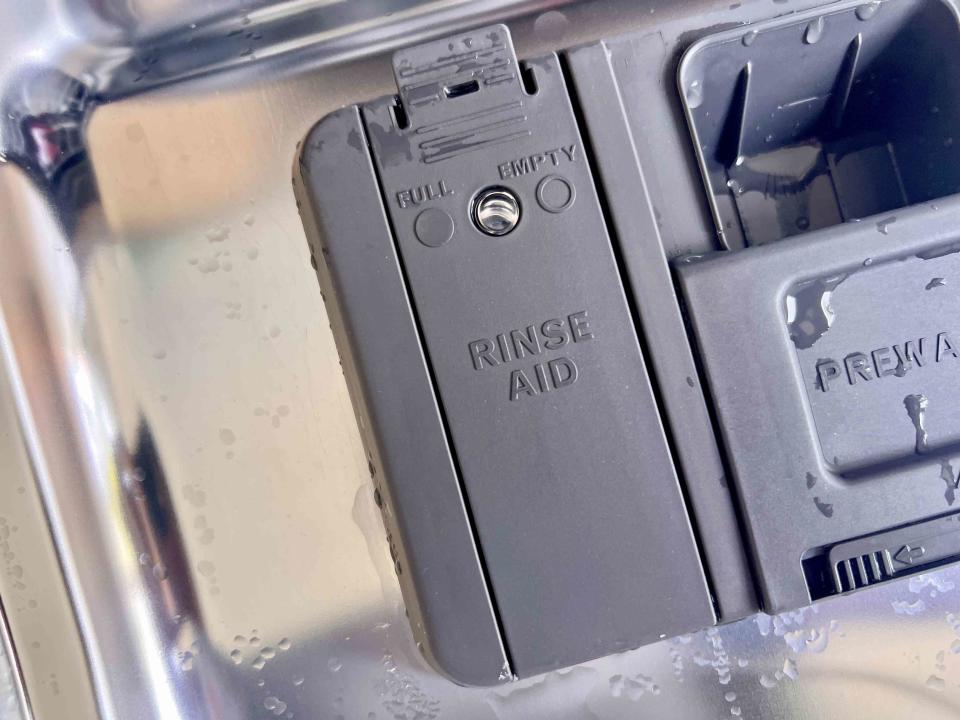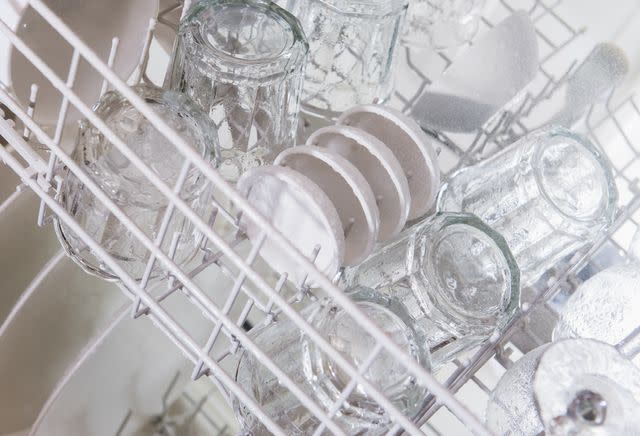You Shouldn't Skip Dishwasher Rinse Aid—Experts Explain Why
Here's what the experts say. Plus, the best and worst brands, according to an environmental health group.

Simply Recipes / Myo Quinn
You know that little compartment in the dishwasher for rinsing solution? It’s usually marked as “Rinse Aid.” Confession: I've always ignored it. That's because I didn't know what rinse aid was, and I assumed that if I didn't know its purpose, there was no point in using it.
I was also pretty far into adulthood before I learned that you should clean your dishwasher once a month, and I began to wonder if using rinse aid was another important domestic task I was recklessly skipping. So I consulted an expert: Larry Ciufo, the head of dishwasher testing for Consumer Reports.
"One of the best ways to improve your dishwasher's drying performance is to use a rinse aid, especially if your dishwasher detergent doesn't contain it—many brands do," Ciufo says.
Read on to learn about rinse aid and why Ciufo and other experts say you should be using it.

Simply Recipes / Getty Images
What Is Rinse Aid, Anyway?
Rinse aid is made of a complex blend of surfactants, salts, and acids, each performing a slightly different task to make your dishes come out of the dishwasher clean, dry, and spot-free.
"The way it works is by breaking the bond between the water molecules and dishes, causing water to slide off of your dishware," says Ciufo. "This also helps reduce spotting."
The ingredients in rinse aid not only help speed drying and reduce spotting, they also help keep bits of food in the wash water from clinging to the dishes, according to a New York Times article. Rinse aid works whether you use the air dry setting on your machine or the heated dry setting.
Read More: Dishwasher vs. Hand Washing: One Way Will Save You More Money and Water
Is Rinse Aid Necessary?
Rinse aid helps your dishes dry better, with fewer spots and less gunk stuck to them. But do you have to use it? Ciufo says that if your dishwasher performs to your liking without rinse aid, it's technically OK to skip it.
He adds, "But for the best results, filling your rinse aid dispenser is the way to go." That's true even if you use a detergent that already has rinse aid.
Dishwasher manufacturers agree with Ciufo. "Dishwashers dry items in a variety of ways," according to a Consumer Reports article about rinse aid. "Some use electric heating coils, others raise the temperature of the water at the end of the cycle using the residual heat to dry, and others use a fan. But for optimal drying, every dishwasher manufacturer recommends rinse aid no matter how your machine works."
Rinse aid became more necessary after phosphates in detergents—they prevent spotting during the wash cycle—were outlawed in 2010 because they cause algal blooms in lakes and reservoirs, according to the New York Times. Rinse aids take over some of the cleaning tasks of the phosphates, but with less environmental concern.
What Are the Safest Brands of Rinse Aid?
The Environmental Working Group's Guide to Healthy Cleaning rates rinse aids from A to F—their scores are determined not just by known dangers to humans and the environment but also by the brand's level of disclosure about the ingredients. Two brands—Ecover and Nature Clean—received top scores. Three popular brands I often see on store shelves—Finish, Jet-Dry, and OxiClean—are ranked the worst rinse aids for your health and the environment.
Can I Use Vinegar Instead of Rinse Aid?
Some people use vinegar as a natural replacement for rinse aid. While vinegar might reduce spotting, over time its acidity can break down the gaskets and other rubber parts of your dishwasher. Vinegar can also discolor metal utensils, pans, and dishes. You're better off skipping rinse aid altogether rather than filling the rinse aid dispenser with vinegar.
Read More: 11 Things You Should Never Put In Your Dishwasher, According to the Experts
The Main Takeaway
The experts agree: Rinse aid is not just a way to get you to spend more money washing dishes. Unless you are 100 percent satisfied with how your dishwasher is performing, it's worth investing in rinse aid for the cleanest, driest, least spotty dishes.
Read the original article on Simply Recipes.


